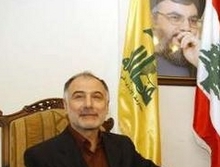 A scandal that could possibly involve the brother of a key Hezbollah official pertaining to imports of illegal pharmaceutical products was uncovered in Lebanon earlier this week.
A scandal that could possibly involve the brother of a key Hezbollah official pertaining to imports of illegal pharmaceutical products was uncovered in Lebanon earlier this week.
The brother of Minister of State for Administrative Reform Mohammad Fneish who represnets Hezbollah in the cabinet is reportedly involved in the case and reportedly four of the implicated companies have relations with the Hezbollah militant group.
Lebanon’s Parliamentary Health Committee chief Atef Majdalani said Thursday that “four pharmaceutical importers were involved in an operation to import more than 100 types of drugs through forged documentation .”
On Friday, Future News television cited sources as saying that Fneish’s brother was the person who “forged the signature” of Health Minister Ali Hassan Khalil , a key ally of Lebanon speaker Nabih Berri in order to import untested pharmaceuticals into the country.
The TV station also revealed that that the drugs entered Lebanon “10 months ago.
Fneish, who is also a Hezbollah parliament member, said in a statement issued Friday that the possibility of his brother being involved in the scandal is an issue that needs to be investigated by the relevant authorities to take the required measures.
He added that he will not protect or provide any cover for any person implicated in the scandal.
“After having been informed about the possible involvement of one of my brothers in the forging of the laboratory certificates and the signature of the the health minister for some medical drugs, I would like to stress that I will leave this matter up to the relevant department and the judicial authorities to take all appropriate measures in the investigation, prosecution and punishment” . He added: “I will not cover up for anyone found guilty of involvement in this matter.”
Al-Mustaqbal newspaper on Saturday identified the companies that are involved in the forgery case as: “City Pharm, Newall Pharma, International Pharma Group; Royal Pharma and Danita Pharm.”
On Friday, the Health Minister praised the “accomplishment achieved” by his ministry to uncover the ring of importers.
“What others considered a medicine scandal is actually a Health Ministry accomplishment since the discovery of the operation came as a result of the ministry’s continuous follow-up,” Khalil told reporters on Thursday.
The presence of counterfeit medications in Lebanon has been a major concern since this is first and foremost a public health issue as patients who use them tend to not improve their conditions on the contrary they suffer even worse complications and potential death. These are in fact non-medicinal products manufactured illegally.
Counterfeit medications are silent killers packaged to look like originals to create confusion among unsuspecting patients who buy and consume them to the detriment of their health.
The sole purpose of counterfeit medications is to make money for the criminals who make and distribute them, selling them clandestinely often at less than the price of originals to enhance their marketing appeal.
This is not the first time fake drugs are discovered in Lebanon. A factory producing counterfeit drugs was discovered in February 2010 by the Customs Department and large quantities of fake medications were confiscated.
Update :Mystery surrounds the case
According to a report in Now lebanon, Lebanon’s Health Ministry said Saturday that the forgery case was referred to a committee associated with the Justice Ministry last month. But a Lebanese judge told a local newspaper that the case is yet to be referred to the relevant authorities.
“The press office of the Health Minister would like to confirm that this case and unlike what some reports said was referred to a committee in the Justice Ministry on October 12, 2012,” a press statement said. “Any other claims are deemed inaccurate.”
The committee which allegedly received the aforementioned case, is tasked with defending the state whenever a lawsuit is made against it.
But Attorney General Judge Hatem Madi told An-Nahar newspaper in an interview published on Saturday that Lebanon’s judicial authority has not yet received any case pertaining to the recently uncovered prescription-drug scandal.
“The last case pertaining to medicine was received by the judicial authority in October 2012 ,” but it was not related to the most recent issue of the untested, non-brand name pharmaceuticals that were illegally imported into Lebanon, the judge also said.

Leave a Reply
You must be logged in to post a comment.